Behaviour in Learning: Theories and Strategies for Early Years
VerifiedAdded on 2023/06/11
|6
|1984
|114
Essay
AI Summary
This essay defines behaviour and explores reasons for its occurrence in learning environments, focusing on social, mental health, and cultural factors, linking them to socio-cultural theory. It evaluates principles and policies for maintaining an optimistic learning environment, emphasizing Vygotsky's socio-cultural theory, which posits that a child's behaviour is influenced by cultural and social factors learned through cooperative discussions. The essay categorizes behaviours into externalizing (aggression, tantrums) and internalizing (worry, sadness), highlighting the importance of social interaction for development and learning. It stresses the role of teachers in adopting proactive approaches, involving parents and professionals, and implementing policies and practices from the Early Years Learning Framework of Australia to foster a positive learning environment and support children's development of self-regulation and social skills.
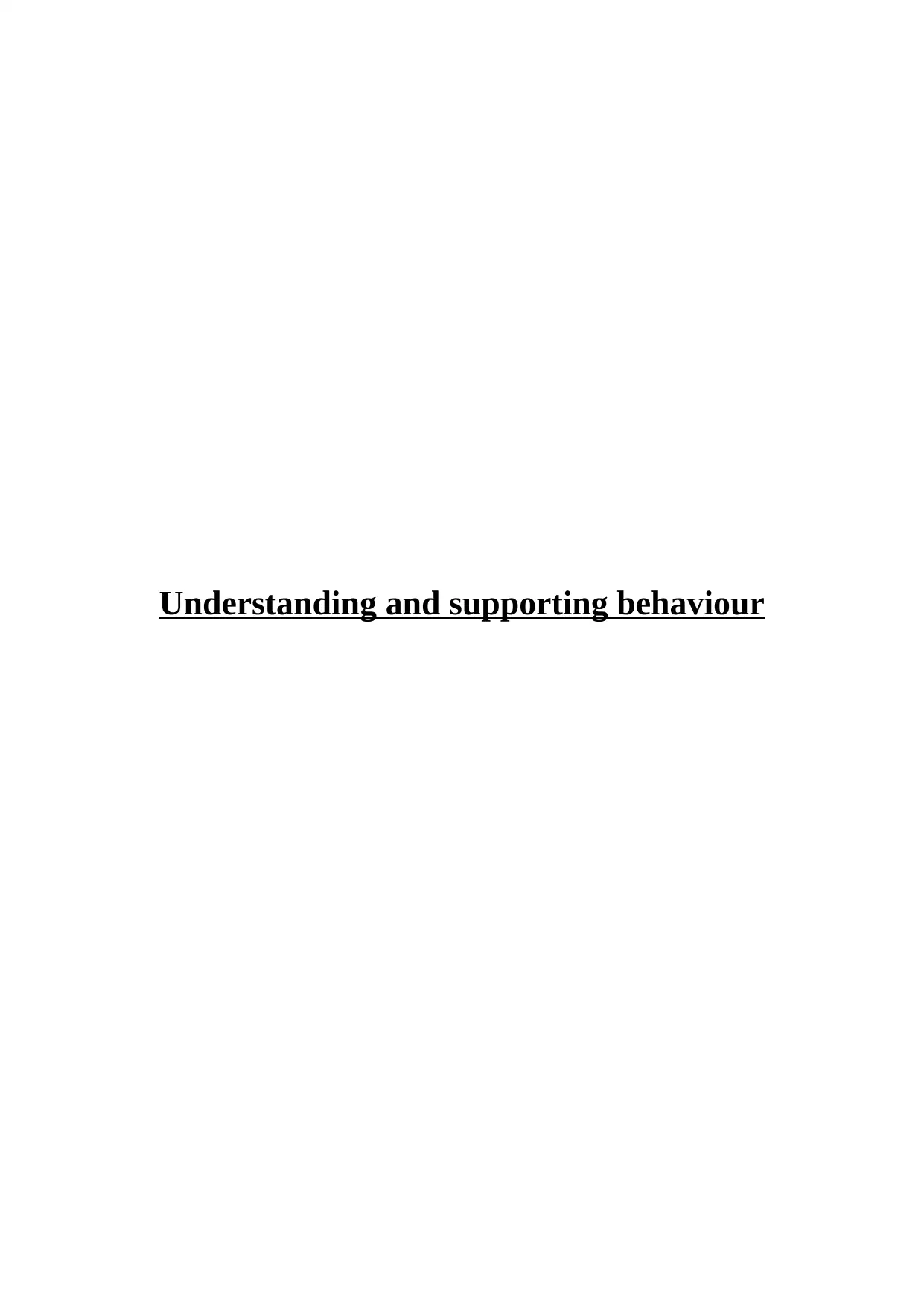
Understanding and supporting behaviour
Paraphrase This Document
Need a fresh take? Get an instant paraphrase of this document with our AI Paraphraser
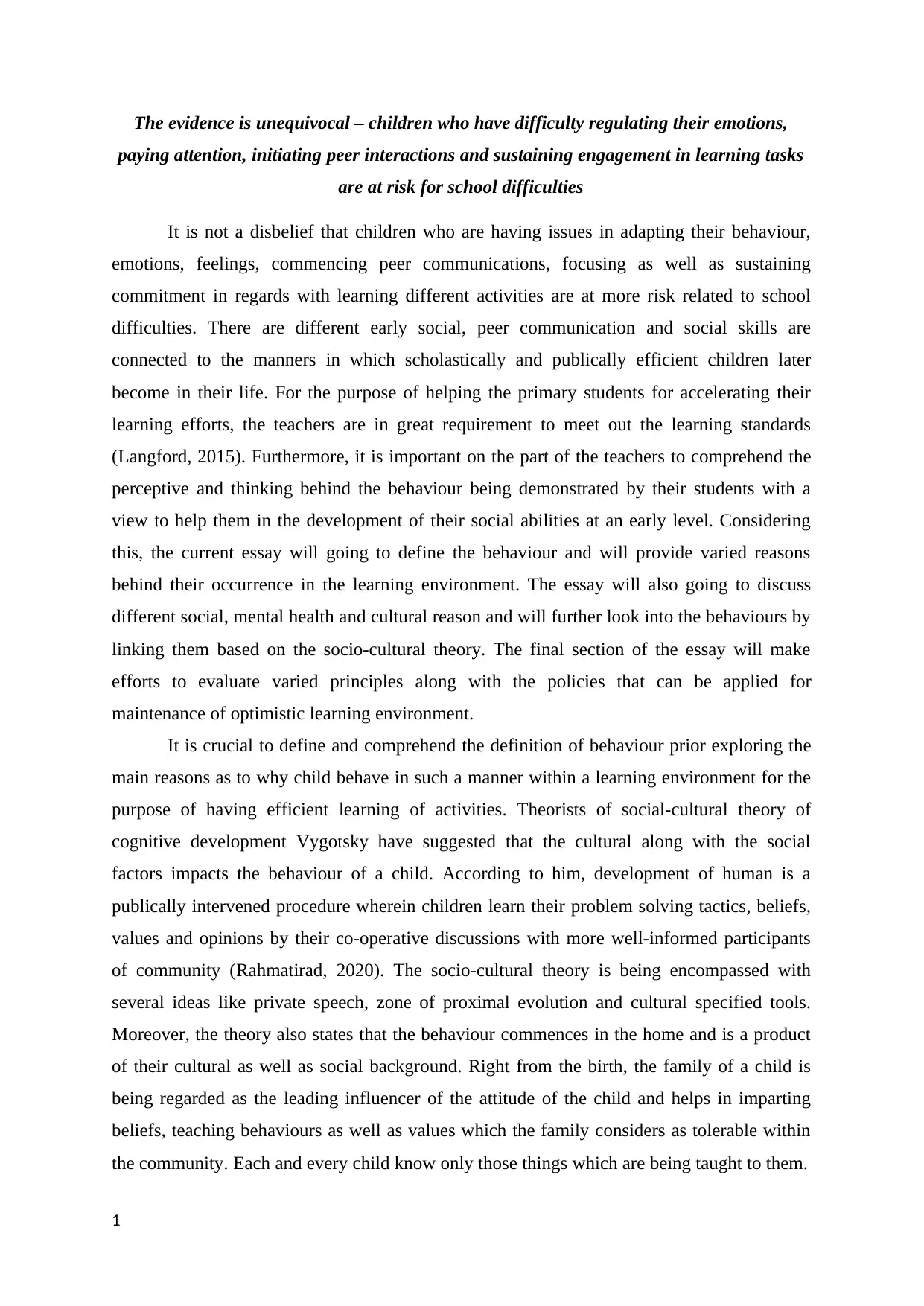
The evidence is unequivocal – children who have difficulty regulating their emotions,
paying attention, initiating peer interactions and sustaining engagement in learning tasks
are at risk for school difficulties
It is not a disbelief that children who are having issues in adapting their behaviour,
emotions, feelings, commencing peer communications, focusing as well as sustaining
commitment in regards with learning different activities are at more risk related to school
difficulties. There are different early social, peer communication and social skills are
connected to the manners in which scholastically and publically efficient children later
become in their life. For the purpose of helping the primary students for accelerating their
learning efforts, the teachers are in great requirement to meet out the learning standards
(Langford, 2015). Furthermore, it is important on the part of the teachers to comprehend the
perceptive and thinking behind the behaviour being demonstrated by their students with a
view to help them in the development of their social abilities at an early level. Considering
this, the current essay will going to define the behaviour and will provide varied reasons
behind their occurrence in the learning environment. The essay will also going to discuss
different social, mental health and cultural reason and will further look into the behaviours by
linking them based on the socio-cultural theory. The final section of the essay will make
efforts to evaluate varied principles along with the policies that can be applied for
maintenance of optimistic learning environment.
It is crucial to define and comprehend the definition of behaviour prior exploring the
main reasons as to why child behave in such a manner within a learning environment for the
purpose of having efficient learning of activities. Theorists of social-cultural theory of
cognitive development Vygotsky have suggested that the cultural along with the social
factors impacts the behaviour of a child. According to him, development of human is a
publically intervened procedure wherein children learn their problem solving tactics, beliefs,
values and opinions by their co-operative discussions with more well-informed participants
of community (Rahmatirad, 2020). The socio-cultural theory is being encompassed with
several ideas like private speech, zone of proximal evolution and cultural specified tools.
Moreover, the theory also states that the behaviour commences in the home and is a product
of their cultural as well as social background. Right from the birth, the family of a child is
being regarded as the leading influencer of the attitude of the child and helps in imparting
beliefs, teaching behaviours as well as values which the family considers as tolerable within
the community. Each and every child know only those things which are being taught to them.
1
paying attention, initiating peer interactions and sustaining engagement in learning tasks
are at risk for school difficulties
It is not a disbelief that children who are having issues in adapting their behaviour,
emotions, feelings, commencing peer communications, focusing as well as sustaining
commitment in regards with learning different activities are at more risk related to school
difficulties. There are different early social, peer communication and social skills are
connected to the manners in which scholastically and publically efficient children later
become in their life. For the purpose of helping the primary students for accelerating their
learning efforts, the teachers are in great requirement to meet out the learning standards
(Langford, 2015). Furthermore, it is important on the part of the teachers to comprehend the
perceptive and thinking behind the behaviour being demonstrated by their students with a
view to help them in the development of their social abilities at an early level. Considering
this, the current essay will going to define the behaviour and will provide varied reasons
behind their occurrence in the learning environment. The essay will also going to discuss
different social, mental health and cultural reason and will further look into the behaviours by
linking them based on the socio-cultural theory. The final section of the essay will make
efforts to evaluate varied principles along with the policies that can be applied for
maintenance of optimistic learning environment.
It is crucial to define and comprehend the definition of behaviour prior exploring the
main reasons as to why child behave in such a manner within a learning environment for the
purpose of having efficient learning of activities. Theorists of social-cultural theory of
cognitive development Vygotsky have suggested that the cultural along with the social
factors impacts the behaviour of a child. According to him, development of human is a
publically intervened procedure wherein children learn their problem solving tactics, beliefs,
values and opinions by their co-operative discussions with more well-informed participants
of community (Rahmatirad, 2020). The socio-cultural theory is being encompassed with
several ideas like private speech, zone of proximal evolution and cultural specified tools.
Moreover, the theory also states that the behaviour commences in the home and is a product
of their cultural as well as social background. Right from the birth, the family of a child is
being regarded as the leading influencer of the attitude of the child and helps in imparting
beliefs, teaching behaviours as well as values which the family considers as tolerable within
the community. Each and every child know only those things which are being taught to them.
1
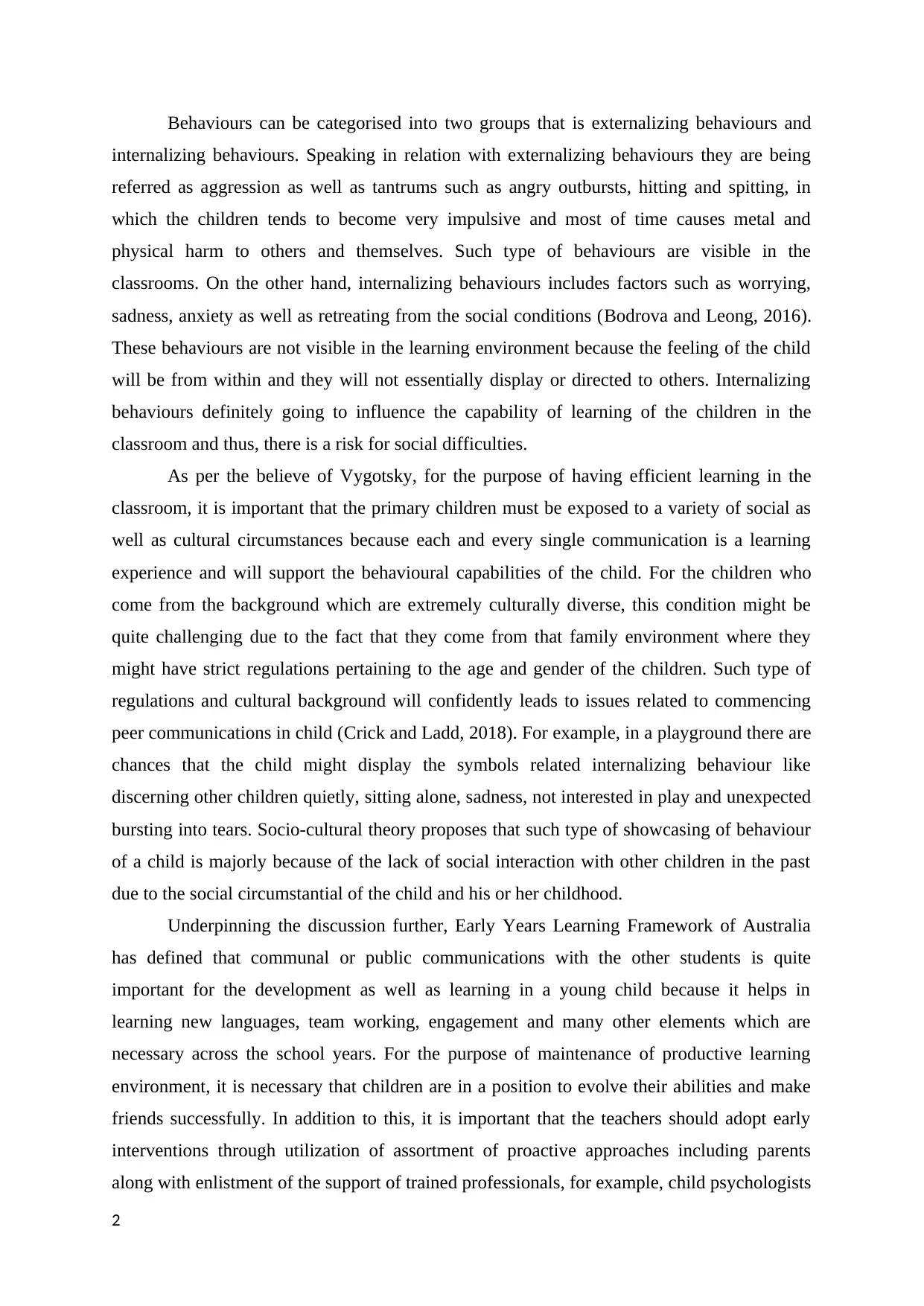
Behaviours can be categorised into two groups that is externalizing behaviours and
internalizing behaviours. Speaking in relation with externalizing behaviours they are being
referred as aggression as well as tantrums such as angry outbursts, hitting and spitting, in
which the children tends to become very impulsive and most of time causes metal and
physical harm to others and themselves. Such type of behaviours are visible in the
classrooms. On the other hand, internalizing behaviours includes factors such as worrying,
sadness, anxiety as well as retreating from the social conditions (Bodrova and Leong, 2016).
These behaviours are not visible in the learning environment because the feeling of the child
will be from within and they will not essentially display or directed to others. Internalizing
behaviours definitely going to influence the capability of learning of the children in the
classroom and thus, there is a risk for social difficulties.
As per the believe of Vygotsky, for the purpose of having efficient learning in the
classroom, it is important that the primary children must be exposed to a variety of social as
well as cultural circumstances because each and every single communication is a learning
experience and will support the behavioural capabilities of the child. For the children who
come from the background which are extremely culturally diverse, this condition might be
quite challenging due to the fact that they come from that family environment where they
might have strict regulations pertaining to the age and gender of the children. Such type of
regulations and cultural background will confidently leads to issues related to commencing
peer communications in child (Crick and Ladd, 2018). For example, in a playground there are
chances that the child might display the symbols related internalizing behaviour like
discerning other children quietly, sitting alone, sadness, not interested in play and unexpected
bursting into tears. Socio-cultural theory proposes that such type of showcasing of behaviour
of a child is majorly because of the lack of social interaction with other children in the past
due to the social circumstantial of the child and his or her childhood.
Underpinning the discussion further, Early Years Learning Framework of Australia
has defined that communal or public communications with the other students is quite
important for the development as well as learning in a young child because it helps in
learning new languages, team working, engagement and many other elements which are
necessary across the school years. For the purpose of maintenance of productive learning
environment, it is necessary that children are in a position to evolve their abilities and make
friends successfully. In addition to this, it is important that the teachers should adopt early
interventions through utilization of assortment of proactive approaches including parents
along with enlistment of the support of trained professionals, for example, child psychologists
2
internalizing behaviours. Speaking in relation with externalizing behaviours they are being
referred as aggression as well as tantrums such as angry outbursts, hitting and spitting, in
which the children tends to become very impulsive and most of time causes metal and
physical harm to others and themselves. Such type of behaviours are visible in the
classrooms. On the other hand, internalizing behaviours includes factors such as worrying,
sadness, anxiety as well as retreating from the social conditions (Bodrova and Leong, 2016).
These behaviours are not visible in the learning environment because the feeling of the child
will be from within and they will not essentially display or directed to others. Internalizing
behaviours definitely going to influence the capability of learning of the children in the
classroom and thus, there is a risk for social difficulties.
As per the believe of Vygotsky, for the purpose of having efficient learning in the
classroom, it is important that the primary children must be exposed to a variety of social as
well as cultural circumstances because each and every single communication is a learning
experience and will support the behavioural capabilities of the child. For the children who
come from the background which are extremely culturally diverse, this condition might be
quite challenging due to the fact that they come from that family environment where they
might have strict regulations pertaining to the age and gender of the children. Such type of
regulations and cultural background will confidently leads to issues related to commencing
peer communications in child (Crick and Ladd, 2018). For example, in a playground there are
chances that the child might display the symbols related internalizing behaviour like
discerning other children quietly, sitting alone, sadness, not interested in play and unexpected
bursting into tears. Socio-cultural theory proposes that such type of showcasing of behaviour
of a child is majorly because of the lack of social interaction with other children in the past
due to the social circumstantial of the child and his or her childhood.
Underpinning the discussion further, Early Years Learning Framework of Australia
has defined that communal or public communications with the other students is quite
important for the development as well as learning in a young child because it helps in
learning new languages, team working, engagement and many other elements which are
necessary across the school years. For the purpose of maintenance of productive learning
environment, it is necessary that children are in a position to evolve their abilities and make
friends successfully. In addition to this, it is important that the teachers should adopt early
interventions through utilization of assortment of proactive approaches including parents
along with enlistment of the support of trained professionals, for example, child psychologists
2
⊘ This is a preview!⊘
Do you want full access?
Subscribe today to unlock all pages.

Trusted by 1+ million students worldwide
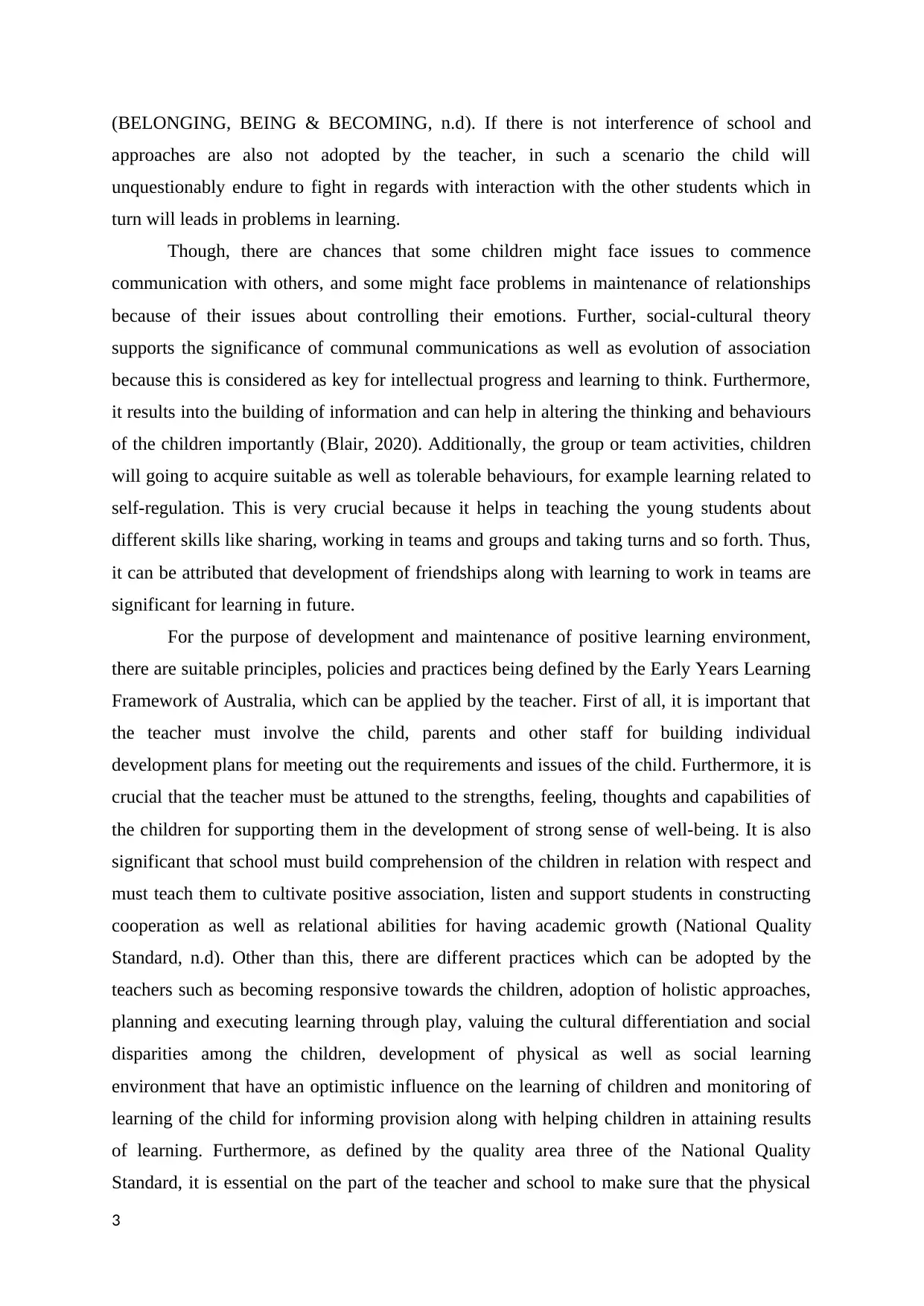
(BELONGING, BEING & BECOMING, n.d). If there is not interference of school and
approaches are also not adopted by the teacher, in such a scenario the child will
unquestionably endure to fight in regards with interaction with the other students which in
turn will leads in problems in learning.
Though, there are chances that some children might face issues to commence
communication with others, and some might face problems in maintenance of relationships
because of their issues about controlling their emotions. Further, social-cultural theory
supports the significance of communal communications as well as evolution of association
because this is considered as key for intellectual progress and learning to think. Furthermore,
it results into the building of information and can help in altering the thinking and behaviours
of the children importantly (Blair, 2020). Additionally, the group or team activities, children
will going to acquire suitable as well as tolerable behaviours, for example learning related to
self-regulation. This is very crucial because it helps in teaching the young students about
different skills like sharing, working in teams and groups and taking turns and so forth. Thus,
it can be attributed that development of friendships along with learning to work in teams are
significant for learning in future.
For the purpose of development and maintenance of positive learning environment,
there are suitable principles, policies and practices being defined by the Early Years Learning
Framework of Australia, which can be applied by the teacher. First of all, it is important that
the teacher must involve the child, parents and other staff for building individual
development plans for meeting out the requirements and issues of the child. Furthermore, it is
crucial that the teacher must be attuned to the strengths, feeling, thoughts and capabilities of
the children for supporting them in the development of strong sense of well-being. It is also
significant that school must build comprehension of the children in relation with respect and
must teach them to cultivate positive association, listen and support students in constructing
cooperation as well as relational abilities for having academic growth (National Quality
Standard, n.d). Other than this, there are different practices which can be adopted by the
teachers such as becoming responsive towards the children, adoption of holistic approaches,
planning and executing learning through play, valuing the cultural differentiation and social
disparities among the children, development of physical as well as social learning
environment that have an optimistic influence on the learning of children and monitoring of
learning of the child for informing provision along with helping children in attaining results
of learning. Furthermore, as defined by the quality area three of the National Quality
Standard, it is essential on the part of the teacher and school to make sure that the physical
3
approaches are also not adopted by the teacher, in such a scenario the child will
unquestionably endure to fight in regards with interaction with the other students which in
turn will leads in problems in learning.
Though, there are chances that some children might face issues to commence
communication with others, and some might face problems in maintenance of relationships
because of their issues about controlling their emotions. Further, social-cultural theory
supports the significance of communal communications as well as evolution of association
because this is considered as key for intellectual progress and learning to think. Furthermore,
it results into the building of information and can help in altering the thinking and behaviours
of the children importantly (Blair, 2020). Additionally, the group or team activities, children
will going to acquire suitable as well as tolerable behaviours, for example learning related to
self-regulation. This is very crucial because it helps in teaching the young students about
different skills like sharing, working in teams and groups and taking turns and so forth. Thus,
it can be attributed that development of friendships along with learning to work in teams are
significant for learning in future.
For the purpose of development and maintenance of positive learning environment,
there are suitable principles, policies and practices being defined by the Early Years Learning
Framework of Australia, which can be applied by the teacher. First of all, it is important that
the teacher must involve the child, parents and other staff for building individual
development plans for meeting out the requirements and issues of the child. Furthermore, it is
crucial that the teacher must be attuned to the strengths, feeling, thoughts and capabilities of
the children for supporting them in the development of strong sense of well-being. It is also
significant that school must build comprehension of the children in relation with respect and
must teach them to cultivate positive association, listen and support students in constructing
cooperation as well as relational abilities for having academic growth (National Quality
Standard, n.d). Other than this, there are different practices which can be adopted by the
teachers such as becoming responsive towards the children, adoption of holistic approaches,
planning and executing learning through play, valuing the cultural differentiation and social
disparities among the children, development of physical as well as social learning
environment that have an optimistic influence on the learning of children and monitoring of
learning of the child for informing provision along with helping children in attaining results
of learning. Furthermore, as defined by the quality area three of the National Quality
Standard, it is essential on the part of the teacher and school to make sure that the physical
3
Paraphrase This Document
Need a fresh take? Get an instant paraphrase of this document with our AI Paraphraser
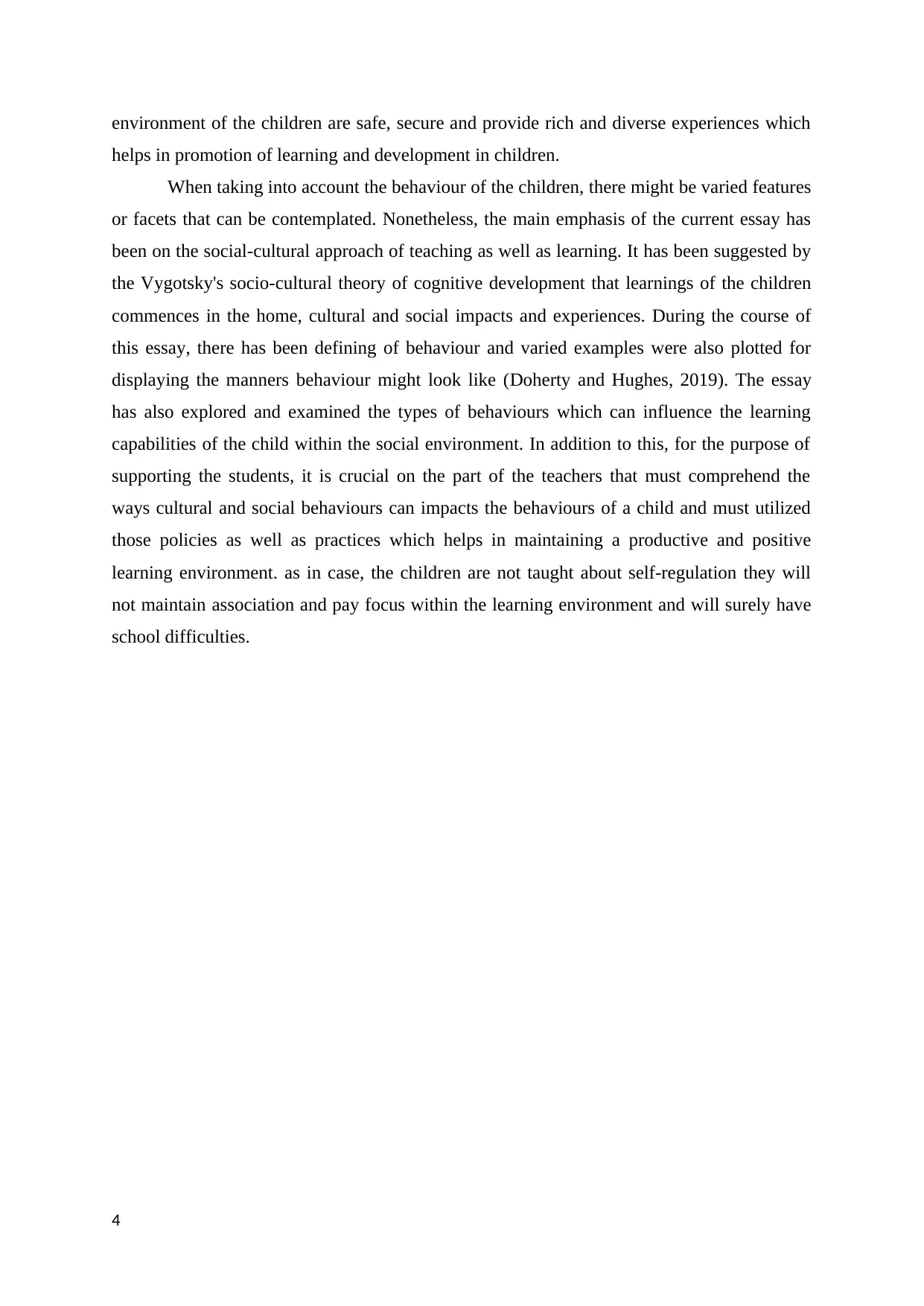
environment of the children are safe, secure and provide rich and diverse experiences which
helps in promotion of learning and development in children.
When taking into account the behaviour of the children, there might be varied features
or facets that can be contemplated. Nonetheless, the main emphasis of the current essay has
been on the social-cultural approach of teaching as well as learning. It has been suggested by
the Vygotsky's socio-cultural theory of cognitive development that learnings of the children
commences in the home, cultural and social impacts and experiences. During the course of
this essay, there has been defining of behaviour and varied examples were also plotted for
displaying the manners behaviour might look like (Doherty and Hughes, 2019). The essay
has also explored and examined the types of behaviours which can influence the learning
capabilities of the child within the social environment. In addition to this, for the purpose of
supporting the students, it is crucial on the part of the teachers that must comprehend the
ways cultural and social behaviours can impacts the behaviours of a child and must utilized
those policies as well as practices which helps in maintaining a productive and positive
learning environment. as in case, the children are not taught about self-regulation they will
not maintain association and pay focus within the learning environment and will surely have
school difficulties.
4
helps in promotion of learning and development in children.
When taking into account the behaviour of the children, there might be varied features
or facets that can be contemplated. Nonetheless, the main emphasis of the current essay has
been on the social-cultural approach of teaching as well as learning. It has been suggested by
the Vygotsky's socio-cultural theory of cognitive development that learnings of the children
commences in the home, cultural and social impacts and experiences. During the course of
this essay, there has been defining of behaviour and varied examples were also plotted for
displaying the manners behaviour might look like (Doherty and Hughes, 2019). The essay
has also explored and examined the types of behaviours which can influence the learning
capabilities of the child within the social environment. In addition to this, for the purpose of
supporting the students, it is crucial on the part of the teachers that must comprehend the
ways cultural and social behaviours can impacts the behaviours of a child and must utilized
those policies as well as practices which helps in maintaining a productive and positive
learning environment. as in case, the children are not taught about self-regulation they will
not maintain association and pay focus within the learning environment and will surely have
school difficulties.
4
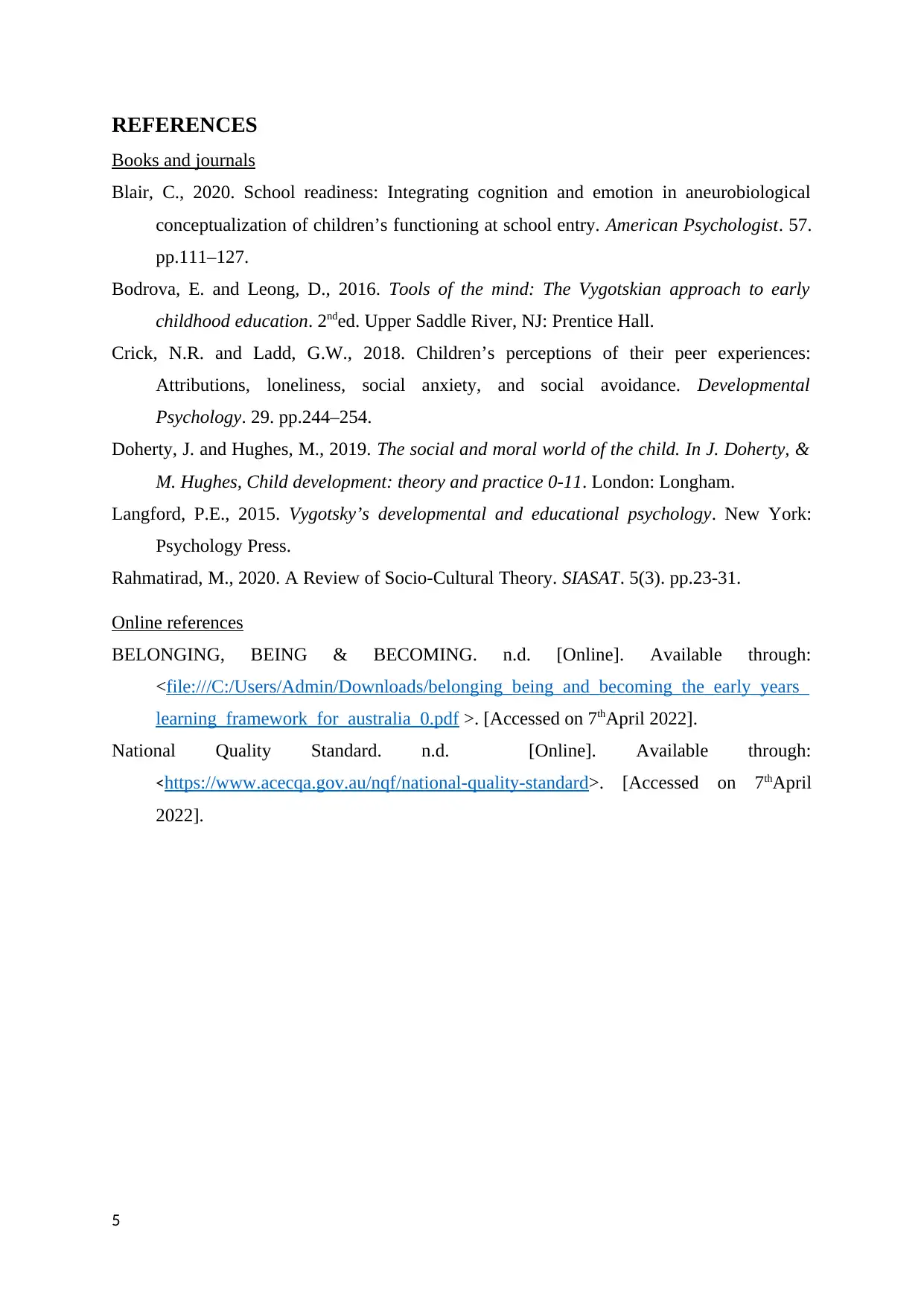
REFERENCES
Books and journals
Blair, C., 2020. School readiness: Integrating cognition and emotion in aneurobiological
conceptualization of children’s functioning at school entry. American Psychologist. 57.
pp.111–127.
Bodrova, E. and Leong, D., 2016. Tools of the mind: The Vygotskian approach to early
childhood education. 2nded. Upper Saddle River, NJ: Prentice Hall.
Crick, N.R. and Ladd, G.W., 2018. Children’s perceptions of their peer experiences:
Attributions, loneliness, social anxiety, and social avoidance. Developmental
Psychology. 29. pp.244–254.
Doherty, J. and Hughes, M., 2019. The social and moral world of the child. In J. Doherty, &
M. Hughes, Child development: theory and practice 0-11. London: Longham.
Langford, P.E., 2015. Vygotsky’s developmental and educational psychology. New York:
Psychology Press.
Rahmatirad, M., 2020. A Review of Socio-Cultural Theory. SIASAT. 5(3). pp.23-31.
Online references
BELONGING, BEING & BECOMING. n.d. [Online]. Available through:
<file:///C:/Users/Admin/Downloads/belonging_being_and_becoming_the_early_years_
learning_framework_for_australia_0.pdf >. [Accessed on 7thApril 2022].
National Quality Standard. n.d. [Online]. Available through:
<https://www.acecqa.gov.au/nqf/national-quality-standard>. [Accessed on 7thApril
2022].
5
Books and journals
Blair, C., 2020. School readiness: Integrating cognition and emotion in aneurobiological
conceptualization of children’s functioning at school entry. American Psychologist. 57.
pp.111–127.
Bodrova, E. and Leong, D., 2016. Tools of the mind: The Vygotskian approach to early
childhood education. 2nded. Upper Saddle River, NJ: Prentice Hall.
Crick, N.R. and Ladd, G.W., 2018. Children’s perceptions of their peer experiences:
Attributions, loneliness, social anxiety, and social avoidance. Developmental
Psychology. 29. pp.244–254.
Doherty, J. and Hughes, M., 2019. The social and moral world of the child. In J. Doherty, &
M. Hughes, Child development: theory and practice 0-11. London: Longham.
Langford, P.E., 2015. Vygotsky’s developmental and educational psychology. New York:
Psychology Press.
Rahmatirad, M., 2020. A Review of Socio-Cultural Theory. SIASAT. 5(3). pp.23-31.
Online references
BELONGING, BEING & BECOMING. n.d. [Online]. Available through:
<file:///C:/Users/Admin/Downloads/belonging_being_and_becoming_the_early_years_
learning_framework_for_australia_0.pdf >. [Accessed on 7thApril 2022].
National Quality Standard. n.d. [Online]. Available through:
<https://www.acecqa.gov.au/nqf/national-quality-standard>. [Accessed on 7thApril
2022].
5
⊘ This is a preview!⊘
Do you want full access?
Subscribe today to unlock all pages.

Trusted by 1+ million students worldwide
1 out of 6
Related Documents
Your All-in-One AI-Powered Toolkit for Academic Success.
+13062052269
info@desklib.com
Available 24*7 on WhatsApp / Email
![[object Object]](/_next/static/media/star-bottom.7253800d.svg)
Unlock your academic potential
Copyright © 2020–2026 A2Z Services. All Rights Reserved. Developed and managed by ZUCOL.





